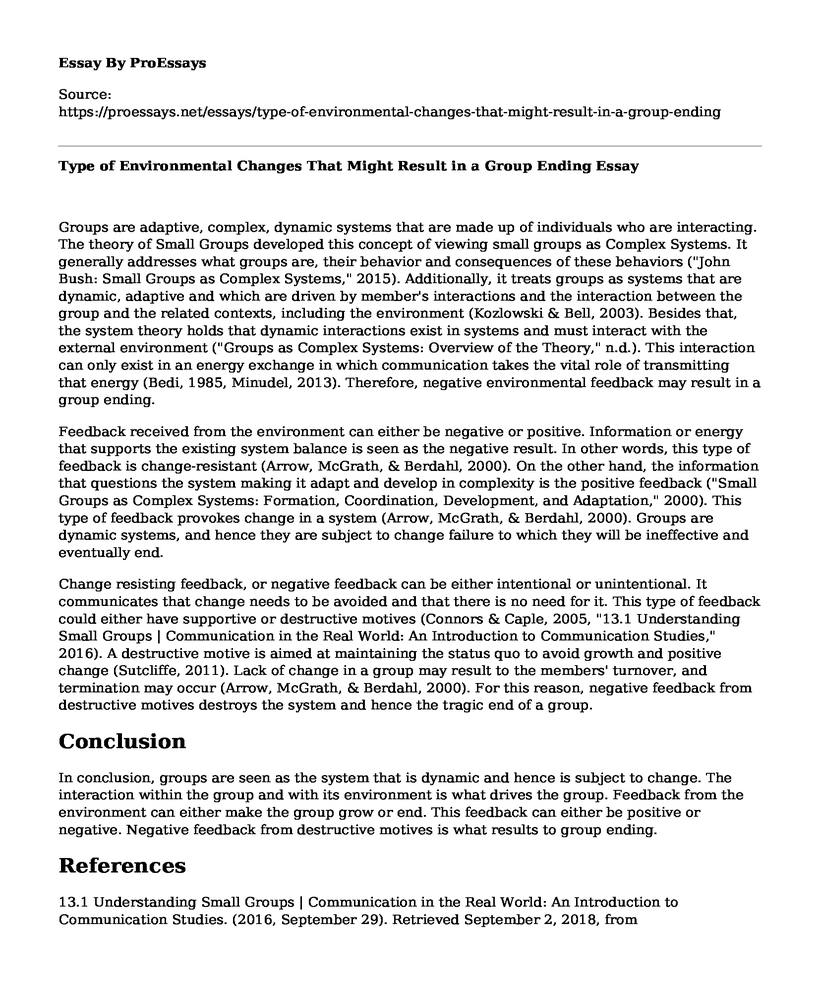Groups are adaptive, complex, dynamic systems that are made up of individuals who are interacting. The theory of Small Groups developed this concept of viewing small groups as Complex Systems. It generally addresses what groups are, their behavior and consequences of these behaviors ("John Bush: Small Groups as Complex Systems," 2015). Additionally, it treats groups as systems that are dynamic, adaptive and which are driven by member's interactions and the interaction between the group and the related contexts, including the environment (Kozlowski & Bell, 2003). Besides that, the system theory holds that dynamic interactions exist in systems and must interact with the external environment ("Groups as Complex Systems: Overview of the Theory," n.d.). This interaction can only exist in an energy exchange in which communication takes the vital role of transmitting that energy (Bedi, 1985, Minudel, 2013). Therefore, negative environmental feedback may result in a group ending.
Feedback received from the environment can either be negative or positive. Information or energy that supports the existing system balance is seen as the negative result. In other words, this type of feedback is change-resistant (Arrow, McGrath, & Berdahl, 2000). On the other hand, the information that questions the system making it adapt and develop in complexity is the positive feedback ("Small Groups as Complex Systems: Formation, Coordination, Development, and Adaptation," 2000). This type of feedback provokes change in a system (Arrow, McGrath, & Berdahl, 2000). Groups are dynamic systems, and hence they are subject to change failure to which they will be ineffective and eventually end.
Change resisting feedback, or negative feedback can be either intentional or unintentional. It communicates that change needs to be avoided and that there is no need for it. This type of feedback could either have supportive or destructive motives (Connors & Caple, 2005, "13.1 Understanding Small Groups | Communication in the Real World: An Introduction to Communication Studies," 2016). A destructive motive is aimed at maintaining the status quo to avoid growth and positive change (Sutcliffe, 2011). Lack of change in a group may result to the members' turnover, and termination may occur (Arrow, McGrath, & Berdahl, 2000). For this reason, negative feedback from destructive motives destroys the system and hence the tragic end of a group.
Conclusion
In conclusion, groups are seen as the system that is dynamic and hence is subject to change. The interaction within the group and with its environment is what drives the group. Feedback from the environment can either make the group grow or end. This feedback can either be positive or negative. Negative feedback from destructive motives is what results to group ending.
References
13.1 Understanding Small Groups | Communication in the Real World: An Introduction to Communication Studies. (2016, September 29). Retrieved September 2, 2018, from http://open.lib.umn.edu/communication/chapter/13-1-understanding-small-groups/
Arrow, H., McGrath, J. E., & Berdahl, J. L. (2000). Small groups as complex systems: Formation, coordination, development and adaptation. Thousand Oaks, CA: Sage Publications.
Bedi, A. R. (1985). Systems Theory and Therapeutic Systems. Group & Organization Studies, 10(3), 340-358. doi:10.1177/105960118501000308
Connors, J. V., & Caple, R. B. (2005). A Review of Group Systems Theory. The Journal for Specialists in Group Work, 30(2), 93-110. doi:10.1080/01933920590925940
Groups as Complex Systems: Overview of the Theory. (n.d.). Small Groups as Complex Systems: Formation, Coordination, Development, and Adaptation, 33-58. doi:10.4135/9781452204666.n3
John Bush: Small Groups as Complex Systems. (2015, December 3). Retrieved from https://psychology.edu/the-psp-community/the-students-at-psp/john-bush-small-groups-as-complex-systems/
Kozlowski, S. W., & Bell, B. S. (2003). Work Groups and Teams in Organizations. Handbook of Psychology. doi:10.1002/0471264385.wei1214
Minudel, L. (2013, January 9). Ideas from the book Small Groups as Complex Systems (SGACS). Retrieved September 2, 2018, from http://blogs.ugidotnet.org/luKa/archive/2013/01/09/ideas-from-the-book-small-groups-as-complex-systems-sgacs.aspx
Small Groups as Complex Systems: Formation, Coordination, Development, and Adaptation. (2000). doi:10.4135/9781452204666
Sutcliffe, A. (2011). Analysing social computing requirements with small group theory. 2011 First International Workshop on Requirements Engineering for Social Computing. doi:10.1109/resc.2011.6046715
Cite this page
Type of Environmental Changes That Might Result in a Group Ending. (2022, Jul 26). Retrieved from https://proessays.net/essays/type-of-environmental-changes-that-might-result-in-a-group-ending
If you are the original author of this essay and no longer wish to have it published on the ProEssays website, please click below to request its removal:
- Essay Example on Racial and Ethnic Diversity
- Essay Sample on Reducing Intergroup Conflict
- Nonverbal Communication Tools and Distances Between People Paper Example
- Annotated Bibliography on Learning Communities
- Essay Example on Religious Donations: Older Generations Lead, Young Follow
- Essay Example on My Journey to Become an Eco-Activist: A High School Grad's Story
- Essay Example on Women and Christianity: A Historical Perspective







